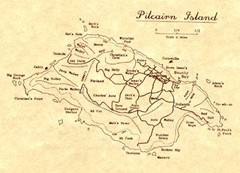 Yesterday’s post about Political Power Units (PPUs) and the Polynesian island of Niue attracted a few dissenting e-mails. These correspondents argued that Microkhan got it wrong by a country mile, and that Niueans are political weaklings when compared to their South Pacific neighbors:
Yesterday’s post about Political Power Units (PPUs) and the Polynesian island of Niue attracted a few dissenting e-mails. These correspondents argued that Microkhan got it wrong by a country mile, and that Niueans are political weaklings when compared to their South Pacific neighbors:
Niue, powerful? Don’t make me laugh, O Mighty Microkhan. By contrast, I give you Pitcairn Island: 48 descendants of the HMS Bounty‘s beleaguered Captain Fletcher Christian. 10 of them serve on the Island Council; 5 of these are elected by popular vote.[See the CIA Factbook for more info—ed.]
Which gives Pitcairn’s impossibly inbred and isolated citizens an enviable PPU of 0.104 apiece.
Not bad, Pitcairn mutineers. Not bad at all.
There’s a potential technical issue here, in that Pitcairn is pretty clearly a British territory; Niue, by contrast, enjoys a so-called “free association” with New Zealand. But Microkhan will let that slide, on the grounds that Pitcairn does have a written constitution, which dates back to 1838.
Plenty more about Pitcairn’s political history can be gleaned from the Pitcairn Islands Study Center at Pacific Union College. And tonight, be sure to down a shot of Crown Royal in honor of Pitcairn’s recent decision to lift its 200-year-old ban on the consumption of alcohol.


Jordan // Apr 15, 2009 at 10:53 am
Collapse by Jared Diamond has a pretty good explanation of what Pitcairn Island was like before the mutineers showed up. In addition to lots of other societies that managed to bork themselves through ecological destruction.
Brendan I. Koerner // Apr 15, 2009 at 1:28 pm
Ah, Collapse–one of the great holes in my reading list. Been meaning to put it on there for ages, esp. since I loved Diamond’s NYer piece on clan fights in PNG. (At least I think he was the writer–memory’s been hazier since the kid was born.) One of these days, one of these days…
Jordan // Apr 15, 2009 at 2:31 pm
Personally, I liked Collapse a lot better than Guns, Germs and Steel. Felt a lot more cohesive and well-argued. Nominally the focus is on environmental collapse, but he manages to avoid the trap of explaining everything from one perspective, instead providing contingent explanations that highlight the limits of any one answer.